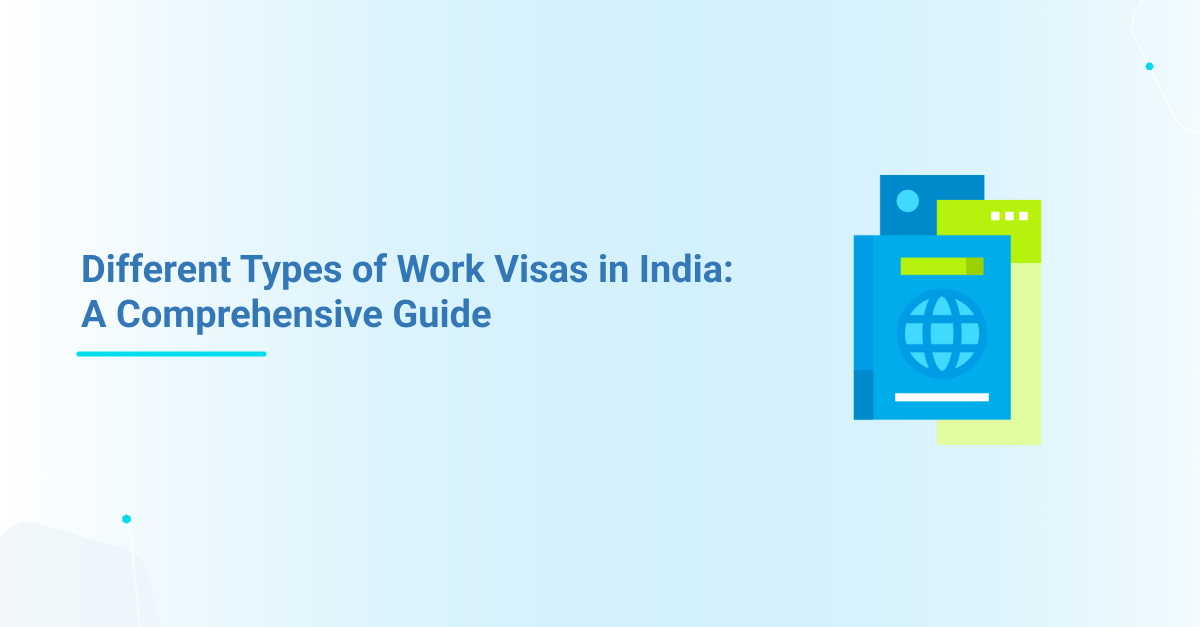Different Types of Work Visas in India: A Comprehensive Guide

Embarking on a professional journey in India involves understanding the country's intricate immigration rules, especially the correct work visa category. This guide is designed to delve deeply into various work visa categories suitable for a diverse group of professionals, including expatriate employees, business travelers, technical experts involved in projects, entrepreneurs, investors looking to start new ventures, journalists, and interns.
Our goal is to clarify each visa category's complexities, providing essential insights and advice to ensure a compliant and successful application process. This knowledge is key to seamlessly integrating into India's vibrant professional environment.
Summary
Types of Work Visas for India
1. Employment Visa
An employment visa in India is granted to highly skilled and qualified foreign professionals. It is important to note that employment visas are generally not issued for routine or ordinary jobs readily filled by local talent. The minimum salary threshold for an employment visa is set at USD 25,000 (INR 1.625 million) per annum. However, certain profiles are exempt from this minimum salary requirement, including ethnic cooks, language teachers, translators, staff of embassies or high commissions, and foreigners engaged in honorary work with NGOs.
The subcategories under Employment visas are as follows:
- E1 Visa: For foreigners employed locally in India.
- E2 Visa: Intended for intra-company transfers of expatriates.
- E3 Visa: Suitable for individuals employed by NGOs.
- E4 Visa: For expatriates involved in the execution of power and steel projects.
An employment visa, depending on the job role, applicant’s nationality, and tenure of the Indian assignment can be issued or extended in up to 5 years. Additionally, expatriates who are issued visas with validity more than 180 days are required to register themselves with the Foreigners' Regional Registration Office (FRRO/FRO) within 14 days of arrival in India.
2. Business Visa
The Business Visa category primarily caters to foreign nationals on intercompany business trips for attending meetings, imparting trainings, overseeing progress, procurement, scouting talent, and other similar or allied purposes. This category also caters to investors and entrepreneurs looking to explore, establish, or manage industrial or business ventures.
The subcategories under Business Visa are:
- B1 Visa: For individuals setting up industrial or business ventures, those engaging in frequent long-term business travel, and investors subject to demonstration of financial stability and expertise in their proposed business field.
- B2 Visa: Business activities not covered under B1.
- B3 Visa: For sports professionals and coaches participating in commercial sports events under a contractual agreement with remuneration.
The Business Visa, depending on the purpose of travel and the applicant’s nationality, can be issued, or extended for up to 5 years. Additionally, expatriates are required to register with the FRRO if their stay in India exceeds 180 days. It should be noted that this requirement may vary depending on the specific endorsement on the visa issued to the foreign national.
E-business Visa
Foreigners can also apply for a multiple-entry E-Business visa, which is tailored for business travelers and investors with engagements in India. Valid for up to one year, e-visa permits multiple entries with a stay limit of up to 180 days.
3. Permanent Residency Status (PRS)
Permanent Residency Status is a scheme introduced by the Indian government to attract foreign investors who wish to invest in the country under the Foreign Direct Investment (FDI) route. PRS grants foreign investors a multiple entry visa without any stay stipulation for an initial period of 10 years, extendable for another 10 years.
Foreign investors promising investment as per the specified threshold limits will be granted an initial business visa, labeled as 'B-4 Visa (Investor)', for 18 months or 36 months, depending on the level of investment promised. This visa will be issued without any stay stipulation, and there will be no requirement of registration with the FRRO/FRO concerned.
Delve into this extensive resource providing detailed insights into Permanent Residency Status by clicking here.
4. Project Visa
Project Visas in India are specifically issued to foreign nationals who are involved in executing projects in the power and steel sectors. These visas are tailored to be project-specific and are non-transferable to other projects. Initially, Project Visas are granted for a period of either one year or for the duration of the project, whichever is shorter. Extensions for these visas can be authorized by state authorities and further eby the Ministry of Home Affairs. Foreign nationals who are issued visas with a validity exceeding 180 days are required to register with the FRRO within 14 days of their arrival in India.
Additional Visa Categories
In addition to the main types of work visas mentioned above, there are several other visa categories that cater to specific purposes:
· VIE - Visa for interns under the French International Internship Programme (VIE)
Foreign nationals visiting India under the VIE may be granted an Intern Visa, subject to certain conditions. This visa is designed for recent graduates within a year of completing their studies. The visa's duration is up to 12 months and can be extended for another 12 months, with a limit of 250 interns per year. Interns must earn a minimum of Rs. 7.80 lakhs annually. The visa application must be made by the French agency handling the VIE, including details of the intern, the host organization in India, and the duration of stay. Interns must comply with all registration rules upon arrival in India.
· Conference Visa
This visa is for foreigners whose sole objective of visiting India is to attend a conference, seminar, or workshop. For business meetings, discussions on business matters of a specific company/organization, or board meetings, a Business Visa or e-Business Visa should be obtained. Conference Visas are also not issued for events involving politically and/or socially sensitive subjects.
· Journalist Visa
Issued to media professionals such as journalists, photographers, documentary makers (excluding commercial films), radio/TV representatives, travel writers, and promotion photographers. In India, a Journalist Visa is typically granted for up to three months. In special cases, a six-month visa with single or double entry may be issued. Multiple entry visas require prior approval from the Ministry of External Affairs.
· Film Visa
Intended for foreign nationals coming to India to shoot feature films, reality TV shows, or commercial TV serials. A Film Visa is issued if the project is approved by the Ministry of Information and Broadcasting. It is specific to the film being shot, valid for one year with multiple entries, and can be extended for another year by the FRRO/FRO. Registration with the FRRO/FRO is mandatory for all individuals on a Film Visa, regardless of the duration of their stay.
Obtaining a work visa in India can seem complex, but with the right information and guidance, the process can be navigated smoothly. Understanding the different types of work visas available and their specific requirements is crucial for a successful application.
Connect with our immigration experts to plan your visa for India: Schedule a call

